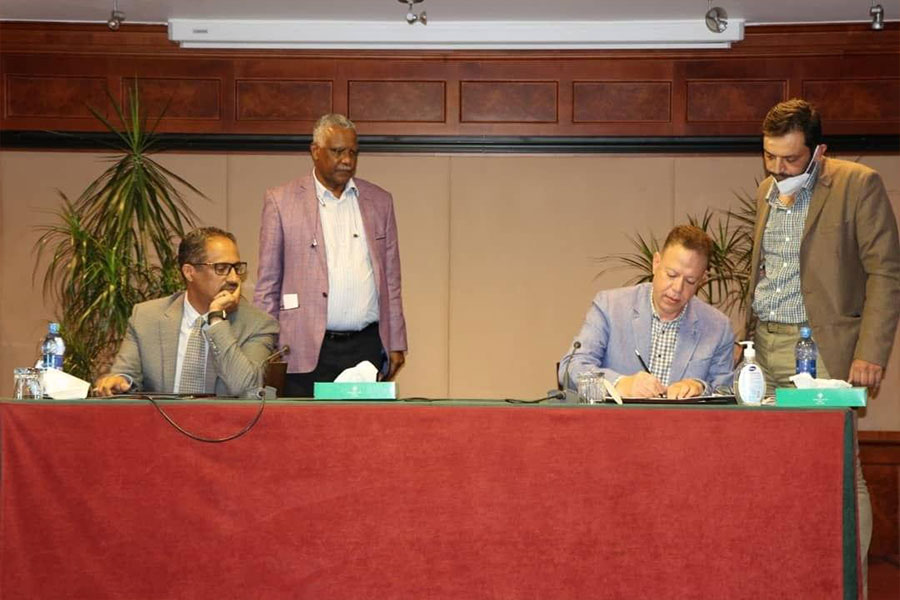
Aug 17 , 2019
By Asseged G. Medhin
The financial sector in Ethiopia has shown growth, but as compared to regional financial institutions, in areas like resource mobilisation, profitability, creditworthiness, job creation, accessibility and innovation, there is still a lot of work to do for policy makers.
When one considers the high quality of professionalism that existed in this country both in the insurance industry and the banks, there is no doubt that the sector should be in a much better position than where it currently sits. Ethiopia used to supply financial professionals to the region 40 years ago. Those experts would have transformed the financial sector here had they not been held back by successive regimes and the wrong policies they followed.
The first roadblock was the socialist ideology the Dergueimposed on Ethiopia. That was followed by the pseudo-free market economy that was put in place by the Revolutionary Democrats. Both models could not serve to create a dynamic business environment. The former completely blocked the industry from growing, while the latter made the government the dominant player in the market by crowding out the private sector.
As an expert in the financial sector, I would argue that had private investors been allowed to operate freely without being pushed out of dynamic competition due to different political ideologies; we would have been enjoying diversified financial products from a large number of financiers and insurers, most at competitive prices.
Since Ethiopia did not follow the right policy and put in place the right framework, rules and regulations that equally applied to all stakeholders in the sector, Ethiopian financial institutions found it extraordinarily challenging to enter into regional, continental and international markets. As a result, the Commercial Bank of Ethiopia is the only Ethiopian financial institution in the top 100 of Africa’s financial institutions. The record shows that none of the insurance companies are ranked in the top 100 of African insurers.
It is clear that what started so well in the old days has not kept up with the times. We are stuck with the mentality of “the old is gold.” But the dynamism, competition and advances in technology, change the saying to “the old is old.’’ There simply needs to be change. The connotation is the ongoing changes in Ethiopia are not optional and just the result of our free will. No institute fumbling with its old success can continue in the 21st century business climate.
The question is not whether change is necessary. The question is whether the current government’s aspiration for change is deep-rooted and interlocked with the ideology of liberalisation in line with clear economic policies or not. Is there the commitment and political will to see the change through to facilitate the opening of the financial sector?
In my view, change should inevitably come to the sector. These huge financial firms have to be opened up eventually through joint venture collaborations to maximise the wealth of the nation.
Ethiopia has a large population, with the lion’s share being youth who are demanding financial services. It is a huge untapped market as compared to less populated countries in Africa such as Uganda, Kenya and South Africa, who paradoxically have more suppliers of these services than Ethiopia because of their open policies.
Now is the time to break the taboo and eradicate the fear of dynamism and competition. We have to take the bold and conscious step of change in strategy. It is time to support and encourage the leadership of Prime Minster Abiy Ahmed (PhD) to follow through with the change agenda to open up the financial sector step by step so that we can follow the regional financial institutions, continental financiers and insurers and be operators in the global markets. Change is inevitable. We should embrace it.
PUBLISHED ON
Aug 17,2019 [ VOL
20 , NO
1007]


Radar | Sep 06,2020

Fortune News | Oct 17,2020

Radar | Jul 13,2020

Fortune News | Nov 09,2019

Radar | Oct 19,2019

Photo Gallery | 174306 Views | May 06,2019

Photo Gallery | 164532 Views | Apr 26,2019

Photo Gallery | 154691 Views | Oct 06,2021

My Opinion | 136660 Views | Aug 14,2021
Editorial | Oct 11,2025

Dec 22 , 2024 . By TIZITA SHEWAFERAW
Charged with transforming colossal state-owned enterprises into modern and competitiv...

Aug 18 , 2024 . By AKSAH ITALO
Although predictable Yonas Zerihun's job in the ride-hailing service is not immune to...

Jul 28 , 2024 . By TIZITA SHEWAFERAW
Unhabitual, perhaps too many, Samuel Gebreyohannes, 38, used to occasionally enjoy a couple of beers at breakfast. However, he recently swit...

Jul 13 , 2024 . By AKSAH ITALO
Investors who rely on tractors, trucks, and field vehicles for commuting, transporting commodities, and f...

Oct 11 , 2025
Ladislas Farago, a roving Associated Press (AP) correspondent, arrived in Ethiopia in...

Oct 4 , 2025
Eyob Tekalegn (PhD) had been in the Governor's chair for only weeks when, on Septembe...

Sep 27 , 2025
Four years into an experiment with “shock therapy” in education, the national moo...

Sep 20 , 2025
Getachew Reda's return to the national stage was always going to stir attention. Once...

Oct 12 , 2025
Tomato prices in Addis Abeba have surged to unprecedented levels, with retail stands charging between 85 Br and 140 Br a kilo, nearly triple...

Oct 12 , 2025 . By BEZAWIT HULUAGER
A sweeping change in the vehicle licensing system has tilted the scales in favour of electric vehicle (EV...

A simmering dispute between the legal profession and the federal government is nearing a breaking point,...

Oct 12 , 2025 . By NAHOM AYELE
A violent storm that ripped through the flower belt of Bishoftu (Debreziet), 45Km east of the capital, in...